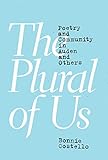The Plural of Us : Poetry and Community in Auden and Others / Bonnie Costello.
Material type: TextPublisher: Princeton, NJ : Princeton University Press, [2017]Copyright date: ©2018Description: 1 online resource (272 p.) : 1 halftoneContent type:
TextPublisher: Princeton, NJ : Princeton University Press, [2017]Copyright date: ©2018Description: 1 online resource (272 p.) : 1 halftoneContent type: - 9780691172811
- 9781400887873
- Poetry -- Criticism and interpretation
- LITERARY CRITICISM / Poetry
- Elizabeth Bishop
- George Oppen
- Law Like Love
- Montaigne
- Plato
- T. S. Eliot
- The Orators
- W. H. Auden
- Wallace Stevens
- Walt Whitman
- ambiguity
- audience relationship
- common
- crowds
- first-person plural
- group identity
- love poems
- love poetry
- performers
- philosophy of language
- plurality
- poems
- poet
- poetic audience
- poetry
- poets
- pronouns
- self
- social thought
- togetherness
- universals
- we
- 821.914 23
- PR6001.U4
- online - DeGruyter
| Item type | Current library | Call number | URL | Status | Notes | Barcode | |
|---|---|---|---|---|---|---|---|
 eBook
eBook
|
Biblioteca "Angelicum" Pont. Univ. S.Tommaso d'Aquino Nuvola online | online - DeGruyter (Browse shelf(Opens below)) | Online access | Not for loan (Accesso limitato) | Accesso per gli utenti autorizzati / Access for authorized users | (dgr)9781400887873 |
Browsing Biblioteca "Angelicum" Pont. Univ. S.Tommaso d'Aquino shelves, Shelving location: Nuvola online Close shelf browser (Hides shelf browser)

|

|

|

|

|

|

|
||
| online - DeGruyter Coming of Age in Medieval Egypt : Female Adolescence, Jewish Law, and Ordinary Culture / | online - DeGruyter The World in a Book : Al-Nuwayri and the Islamic Encyclopedic Tradition / | online - DeGruyter Utopias of One / | online - DeGruyter The Plural of Us : Poetry and Community in Auden and Others / | online - DeGruyter Semi-Detached : The Aesthetics of Virtual Experience since Dickens / | online - DeGruyter What the Victorians Made of Romanticism : Material Artifacts, Cultural Practices, and Reception History / | online - DeGruyter Tact : Aesthetic Liberalism and the Essay Form in Nineteenth-Century Britain / |
Frontmatter -- Contents -- Acknowledgments -- 1. Speaking of Us -- 2. The Demagogue and the Sotto Voce -- 3. Song of My Selves -- 4. Private Stuff and Public Spirit -- 5. Tribes and Ambiguities -- 6. Poet and Audience -- 7. Crowds, Publics, Congregations -- 8. Invitations to the Common -- 9. The Future of Us -- Notes -- Bibliography -- Index
restricted access online access with authorization star
http://purl.org/coar/access_right/c_16ec
The Plural of Us is the first book to focus on the poet’s use of the first-person plural voice—poetry’s “we.” Closely exploring the work of W. H. Auden, Bonnie Costello uncovers the trove of thought and feeling carried in this small word. While lyric has long been associated with inwardness and a voice saying “I,” “we” has hardly been noticed, even though it has appeared throughout the history of poetry. Reading for this pronoun in its variety and ambiguity, Costello explores the communal function of poetry—the reasons, risks, and rewards of the first-person plural.Costello adopts a taxonomic approach to her subject, considering “we” from its most constricted to its fully unbounded forms. She also takes a historical perspective, following Auden’s interest in the full range of “the human pluralities” in a time of particular pressure for and against the collective. Costello offers new readings as she tracks his changing approach to voice in democracy. Examples from many other poets—including Walt Whitman, T. S. Eliot, Elizabeth Bishop, and Wallace Stevens—arise throughout the book, and the final chapter offers a consideration of how contemporary writers find form for what George Oppen called “the meaning of being numerous.”Connecting insights to philosophy of language and to recent work in concepts of community, The Plural of Us shows how poetry raises vital questions—literary and social—about how we speak of our togetherness.
Mode of access: Internet via World Wide Web.
In English.
Description based on online resource; title from PDF title page (publisher's Web site, viewed 01. Dez 2022)


